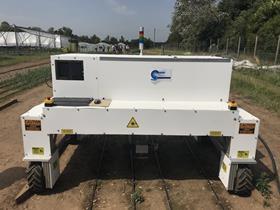
A new weed-killing robot from British researchers can reduce herbicide usage on crops by 95 per cent.
The eyeSpot bot uses cameras to distinguish weeds from the crop, assessing the growth of the weed, and the necessary herbicide dose, before deploying a cutting-edge spot ejector to accurately apply herbicide droplets to individual leaves.
The autonomous machine is being developed by experts at the University of Reading, Precision Farming Robotics, Concurrent Solutions, and Knight Farm Machinery, and is part-funded by AHDB.
Nikolas Koukiasas from the University of Reading and eyeSpot key researcher said: “eyeSpot represents a paradigm swift to weed control by accurately targeting leaf-specific droplet applications. Preliminary results of manual droplet applications showed excellent weed control and a 95 per cent reduction of herbicide use in cabbages, and 74 per cent in leeks”
Researchers say the eyeSpot can also benefit the environment by reducing the need for mechanical weed control, meaning less fuel and lower irrigation needs through lower soil moisture losses.
With data playing a bigger role in farming, imagery from the eyeSpot’s weed management can also be used for crop management, with the observation of growth rates enabling accurate scheduling of operations, detection of crop stress and early yield estimates.



